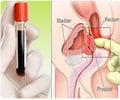At the University of California, San Diego, a team of cancer researchers has identified the existence of precursor cells in early prostate cancers.

The scientists'' findings, suggesting that potentially lethal castration-resistant prostate carcinoma cells already exist in some cancer patients at the very early stages of their disease, will be published by PLOS ONE on September 25, 2013.
The work describes the isolation and propagation of the earliest prostate cancer cells yet identified in human prostate cancer biopsy samples, allowing the detailed molecular characterization of these very early-stage cancer cells, including analysis of gene expression and mutations.
"Full molecular characterization of the earliest prostate cancer cells will facilitate identification of pharmacological approaches which are not currently available," said Martin Haas, PhD, professor of biology and oncology at UC San Diego Moores Cancer Center. "Development of such early-stage treatments could reduce the incidence of cancer progression to recurrent invasive or metastatic disease."
Treatments for prostate cancer often target androgen pathways. Androgens are male hormones, such as testosterone, that research shows can feed prostate tumors. Castration-resistant (CR) prostate cancer is prostate cancer that has become resistant to medical or surgical treatments that lower testosterone.
The UC San Diego researchers, including Stephen M. Baird, MD, and Daniel J. Donoghue, PhD, isolated a class of prostate cancer cells from early-stage human prostate carcinomas that had been removed by surgical prostatectomy and cultured the cells in a synthetic medium devoid of steroid hormones. In this way, early prostate cancer cells (CR-PrCA) were isolated from dozens of early Stage I prostate carcinoma cases.
Advertisement
Extensive characterization of these CR-PrCa cells has shown them to share characteristics with multipotent cancer stem or progenitor cells that possess basal prostate cell characteristics.
Advertisement
The hope is that possible future treatments targeting these early-stage prostate cancer precursor cells might increase cures and improve long-term survival rates.
According to the American Urological Association, prostate cancer is the most commonly diagnosed solid organ malignancy in the United States and remains the second leading cause of cancer deaths among American men. Approximately 240,000 new diagnoses of prostate cancer and over 28,000 deaths were estimated in the U.S. in 2012.
Additional contributors to the study include Rita R. Fiñones, PhD, Jo Yeargin, Melissa Lee, Aman Preet Kaur, Clari Cheng, Paulina Sun, Christopher Wu, Catherine Nguyen, Jessica Wang-Rodriguez, MD and April N. Meyer, all of UC San Diego.
The study was funded by the UC San Diego Foundation.
Source-Newswise

![Prostate Specific Antigen [PSA] & Prostate Cancer Diagnosis Prostate Specific Antigen [PSA] & Prostate Cancer Diagnosis](https://images.medindia.net/patientinfo/120_100/prostate-specific-antigen.jpg)







